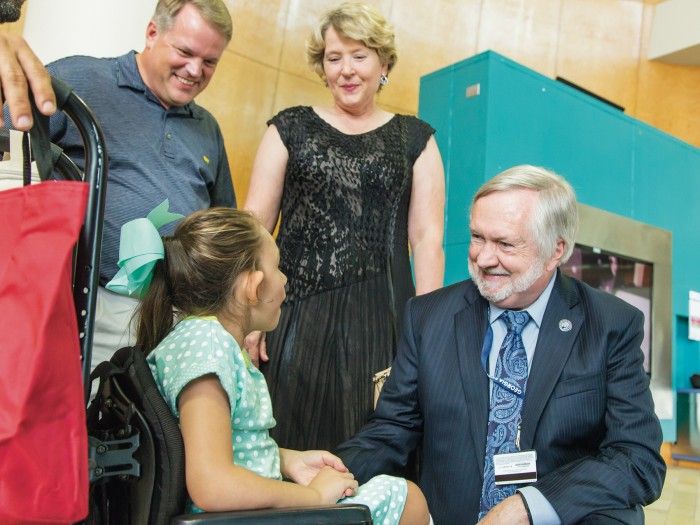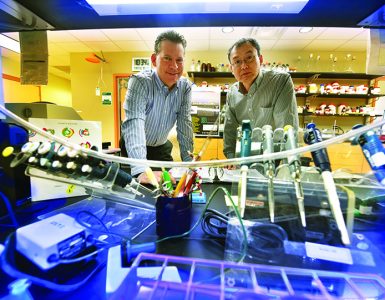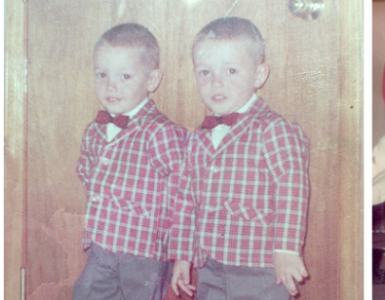 President Reflects on Fulfillment of Coming Full Circle
President Reflects on Fulfillment of Coming Full Circle
You had great success and seemingly tremendous career satisfaction as president of Georgia Southern University for the past five and a half years. Why did you return to your alma mater?
The opportunity to be president of both my graduate and undergraduate alma mater is incredibly unique. I find it enormously fulfilling to oversee a major biomedical research university, and I really appreciate the wonder of an undergraduate campus. There’s a real electricity in this environment. One of the great benefits of consolidation is that now we’re able to bring undergraduates and graduate/professional students together as never before. I find that those in the health sciences have a natural love of creative pursuits, and we have greater opportunities than ever to bring art and science together. We also have vital pipelines in place – and we’re creating more – to expedite undergraduates’ passage into graduate or professional school. Appreciating the importance of both art and science, and finding ways for one to complement the other: that’s the future of GRU. It’s an incredibly exciting time to be here.
How did your graduate education at Georgia Regents University (then the Medical College of Georgia) shape your career?
I earned my Ph.D. in reproductive endocrinology, a discipline in which MCG has been tremendously influential. This is where Dr. Robert B. Greenblatt published the first scientific paper on the sequential form of oral contraception. Dr. Tom Abney was my mentor, and Dr. Virendra Mahesh (who vaulted the department to national prominence for its accomplishments in reproductive endocrinology and steroid metabolism during his tenure) chaired the department while I was here. I had a National Institutes of Health-funded lab for many years before moving into administration. I’ve got a broad experience base on which to build, and it all started here. I had an excellent education, and I’m very grateful for it.
Do you miss the lab?
I like to say that even though I gave up my lab when I moved into administration, I gained 800 new ones. I now live vicariously through the success of others. My job is not just administrator but facilitator of other people’s goals and dreams.
How would you characterize the Medical College of Georgia’s research initiative?
We have real strengths in areas including neurology, cardiology, cancer and pediatric care. Then we have emerging strengths in areas such as preventive medicine, public health, personalized medicine/genomics and regenerative medicine. We’re moving quickly toward National Cancer Institute designation, and that will advance our mission significantly. We’ve got a lot of great things to build on.
How do you plan to build on them?
I want this university to be a top-50 research institution, and of course the medical school is a major player in that goal. We need about $30 million more in National Institutes of Health funding. That’s going to be very, very heavy lifting. It won’t happen overnight, but I’ll make sure we’re on track to get there. I also want to see more research collaboration. For instance, I’d like to see our medical school capitalize on engineering research at Georgia Tech and Georgia Southern. We can’t really go down this road on our own. It’s too expensive and resource-intensive to duplicate services or facilities.
What are your perceptions of the MCG faculty and staff?
They are outstanding, and morale is very, very good. The outlook for the future is incredible. I’ve heard nothing but good things about consolidation. This is a new opportunity to move forward. I want to address barometers of faculty and staff satisfaction such as salaries and workload. I plan to invest in people, facilities, translational research . . . I want our faculty to have the time and resources needed to pursue their research, both in the lab and at the bedside.
How do you plan to enhance MCG students’ education?
I feel very strongly about making education affordable for all of our students. In addition to addressing state subsidies, both achievement-based and needs-based scholarships are key. Alumni are looking back and realizing they need to lend a hand to those coming behind them. I hope to help inspire them to act on that. Of course, MCG already offers students an excellent education at an exceptional value, and I plan to build on that. We want to expand collaboration, for instance, by incorporating more engineering into our medical students’ education. Technology is a huge component of medicine today. It won’t be long before three-dimensional printers will be in every operating room. We have to prepare our students for those technological advances, and we’re already well on our way. The Harrison Education Commons, for instance, provides incredible laboratory and teaching facilities. Not only do our facilities benefit our professional students, but they serve as a constant reminder to undergraduates that that’s where they want to be.
What is MCG’s role in addressing the statewide physician shortage?
Our medical students’ education is vital not only for their career goals, but for the well-being of the state. Georgia is woefully low on physicians per capita (approximately 179.9 physicians per 100,000 citizens, the 10th-lowest ratio in the nation). We’ve increased our class size here in Augusta, and our satellite campuses and partner campus in Athens are helping alleviate the shortage. Another very important aspect of addressing the shortage is creating new residency sites. We’re working very hard to build partnerships that create new ones. Our successes throughout the state are largely due to special relationships with private-practice physicians, and I want to continue to cultivate those relationships.
How do you plan to engage with alumni to advance your goals?
We want our alumni to feel like the value of their diploma is continually increasing. And when we approach them about helping us advance our mission, I want to change the focus. Rather than asking for financial assistance for, say, a particular program or need, I want to ask potential donors, “What are you passionate about?” We shouldn’t assume anything; biomedical researchers might feel passionate about music, for instance. I want to focus on cultivating individual donors by tapping into their individual passions. The donor will be the one driving the train. The deans and faculty will be pivotally involved; we want to put them front and center. After all, who better relates to alumni than those working in the trenches to advance the mission of their alma mater?
How can the MCG Foundation help?
I want to do everything I can to help the foundation carry on its mission, both in advancing MCG’s best interests and in serving in a mentoring role to our other foundations. We can learn a lot from the foundation’s tremendous accomplishments (including amassing endowment assets of over $228 million during its 60-year history). I’m eager for all three of our foundations (those representing MCG, the Health Sciences Campus and the Summerville Campus) to work together toward common goals. I’m committed to helping leverage the strengths of all three.
What are your goals for the clinical mission, and where does MCG fit in?
I want this to be a destination site for those across the country and beyond, based largely on the excellent health care they can receive in Augusta. We have so much to offer, and we want people from all over the world to want to be here. Of course, we have to address financial and economic realities while also building for the future. There will always be challenges in health care – always have been, always will be. You have to be flexible and nimble enough to deal with not only what is happening now, but what is happening down the road. We’re vigorously pursuing new and strengthened partnerships. There’s no need to duplicate efforts; we want to partner with existing resources for mutually beneficial outcomes.
What role do you envision for the community in advancing the university’s goals?
I understand and appreciate the Augusta community. I’ll spend a lot of time engaging with community members. The university can’t succeed without Augusta, and Augusta can’t succeed without it. We want to contribute to the economic development of the community and serve as a magnet for the best minds nationwide and beyond. We have to make sure we live up to our obligation to make Augusta a better place.
Any parting thoughts?
No one person can do everything. I’ve always surrounded myself with outstanding people. I rely on an excellent staff to keep me informed and to keep me out of their way when necessary. We’ve got a great faculty and staff here. I rely on them to do their jobs. I’ve spent the last 30 years in training for this job, and I’m tremendously excited to be here.
[su_note note_color=”#efefee” text_color=”#000000″ class=”story-side-box”]Editor’s note: GRU’s second president, Dr. Brooks Keel, pictured with wife Dr. Tammie Schalue, sat down with MCG Medicine shortly after coming on board in July to discuss his goals for the university and its medical college.[/su_note]








